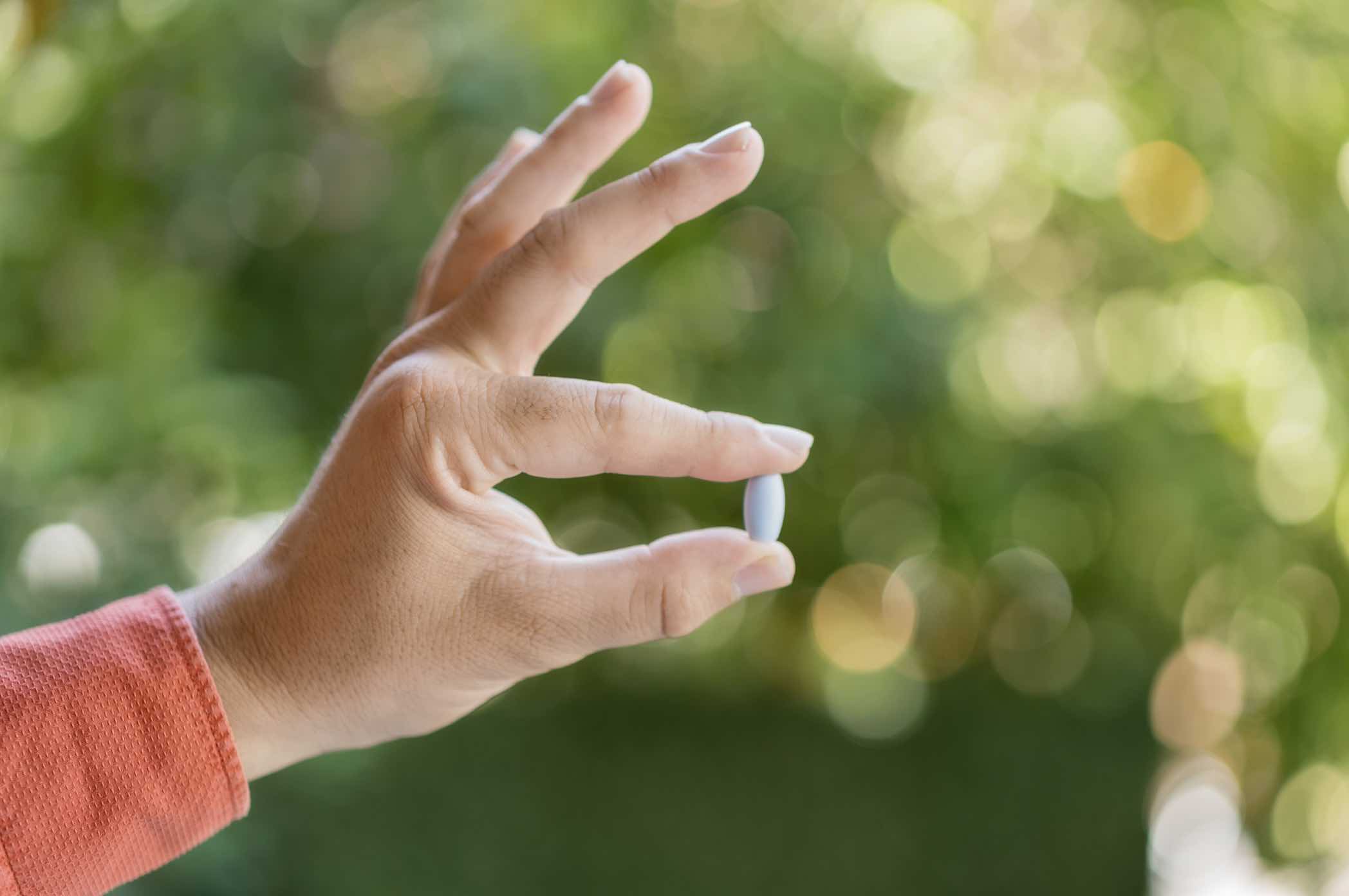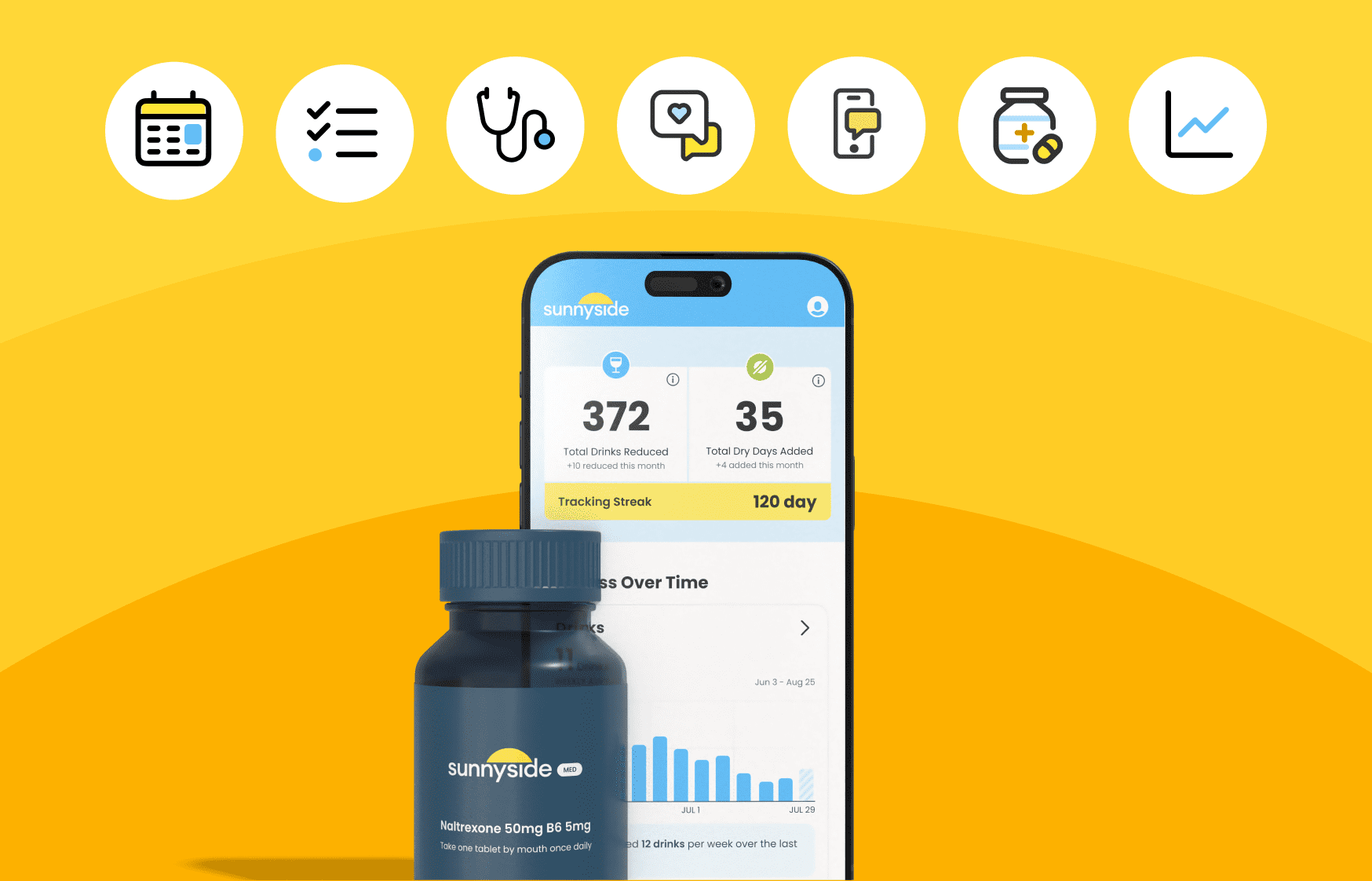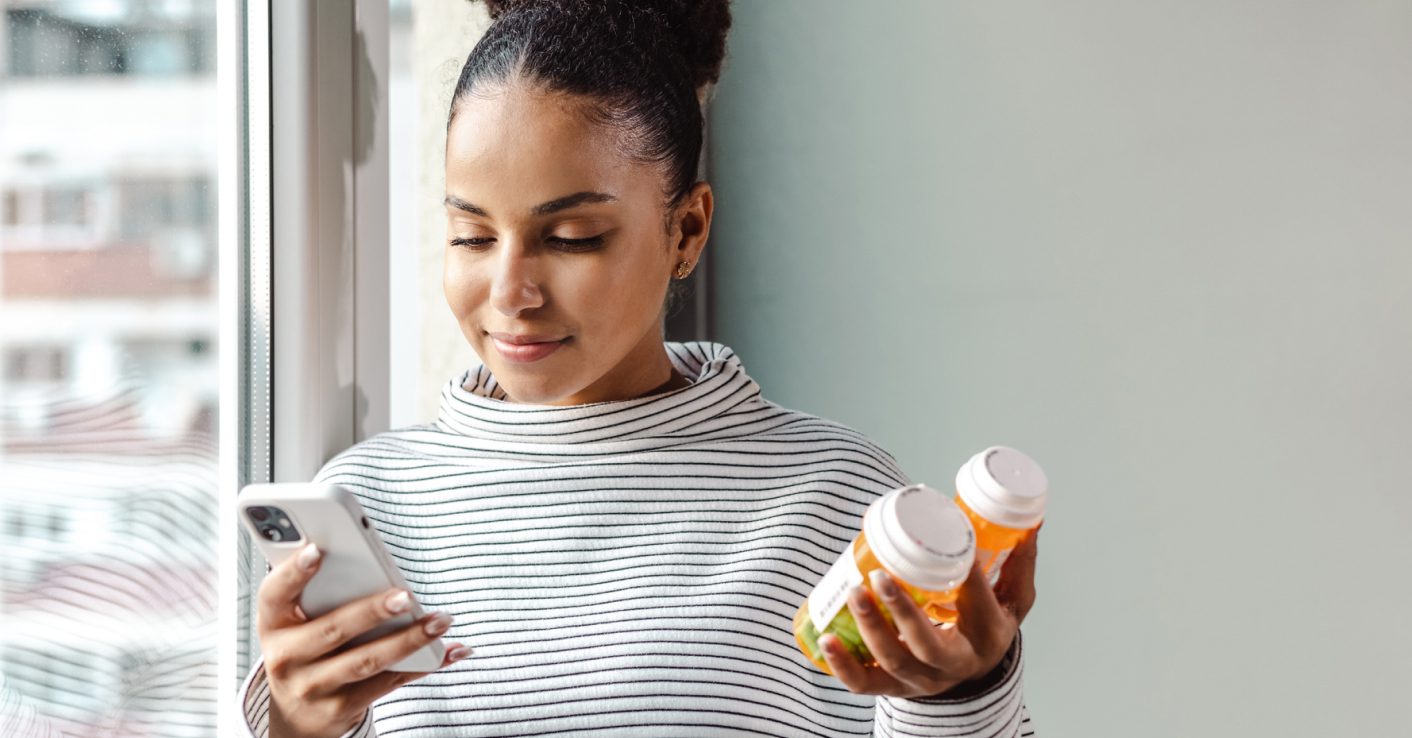Last Updated on June 14, 2023
We all know those warm fuzzy feelings we get after a drink or two. You’re more relaxed, talkative, and maybe your worries don’t seem as complicated as they did before. Of course, that feeling doesn’t last.
Either you stop drinking and the buzz wears off, or you have too much and wake up feeling worse than ever with a bad hangover. But that’s just the short term, what happens with heavy and prolonged alcohol use?
In this article, we’ll cover how your brain chemicals change with alcohol and how it can increase anxiety and depression, both in the short and long term.
Get your Sunnyside trialHow Alcohol Alters Your Emotions
As soon as you start drinking, alcohol enters your bloodstream and begins to change how your neurochemicals and central nervous system function.
Alcohol is a depressant, which means it reduces your libido and stimulation by slowing down the messages between your brain and body. At first, you’ll feel calm and less inhibited, but with larger doses, it’ll slow your reaction time and impair your judgment so you make poor decisions.
The Effects of Light Drinking
When you first have a bit of alcohol, you feel more carefree thanks to the neurotransmitter gamma-aminobutyric acid, or GABA, which slows certain neurons and acts like a sedative.
And if you were feeling tense and anxious beforehand, you’ll feel even better since it slows your breathing and heart rate, taking away those panicked anxiety symptoms, like shortness of breath and rapid heart rate.
You’ll also get a hit of dopamine, making you feel almost euphoric. It’s a neurotransmitter that affects how you perceive rewards and feel pleasure by achieving your goals. And since drinking creates a rewarding feeling, your brain can begin to associate alcohol with pleasure. But this can make you crave more alcohol whenever you feel down and don’t have other options that feel as rewarding. And since using alcohol to cope with stress is not only socially acceptable but often encouraged, it’s an easy habit to fall into.
On top of dopamine the other feel-good chemical, serotonin also gets an initial release when you begin to drink. You’ll get that balance mood and feel a more general sense of well-being.
Anxiety and Depression After Drinking Heavily
Your brain becomes less sensitive to GABA and dopamine with heavy drinking, which means you won’t feel as good as you used to after a drink or two. This can make you feel like you need more and more to get feel-good results, increasing tolerance and dependence.
GABA becomes depleted after a few drinks, so you’re still going to feel more depressed or anxious even if it’s just one night of heavy drinking. This means the initial relaxation from one or two drinks can now turn into a state of anxiety.
Your serotonin levels can also change, creating an imbalance that can lead to decreasing overall levels, even when you’re not drinking. That means you could feel more anxious and depressed in general with heavy drinking. It’s also part of what contributes to withdrawal symptoms and increasing alcohol dependence.
In the end, all these chemical changes mean drinking while depressed or anxious make symptoms worsen, and it can create symptoms in healthy people, too.
Side Effects of Heavy Drinking
On top of neurochemicals and hormones working differently, heavy drinking can lead to:
- Relationship or work issues
- Imbalanced gut bacteria
- B vitamin deficiencies
- Difficulty sleeping
- Inflammation
- Headaches
- Fatigue
Naturally, dealing with these issues is going to increase your levels of stress. It’s not just the neurochemical changes that affect depression and anxiety, but the 360 effects of drinking too much. For example, with long-term inflammation your risk of developing a chronic condition like diabetes or heart disease increases. And managing a health condition creates an increased risk of depression and anxiety, too.
Alcohol can also cause imbalanced gut bacteria, which can make stress harder to manage. Your mood depends on the health of your gut-brain axis, so any imbalance increases both the strength of current symptoms and the risk of developing a clinical mood disorder.
The same is true for a B vitamin deficiency, which commonly happens with heavy alcohol use. Many people with major depression have low levels of B vitamins since alcohol can decrease an enzyme needed to metabolize these vitamins. This can also worsen symptoms and increases the risk of developing a major depressive disorder. And in this case, a supplement is not the sole treatment option — decreasing the amount of alcohol consumed is also necessary.
Take the 3-min quizIn Summary: Does Alcohol Cause Depression and Anxiety?
As research and brain chemical changes prove, it’s no secret that alcohol can make you feel depressed and anxious. And not just the day after drinking too much, where your head and stomach hurt and you’re feeling cranky and exhausted.
Many studies show that having an alcohol use disorder at least doubles the odds of developing depression and anxiety disorders. Luckily, it’s also clear that abstaining from alcohol substantially reduces depressive and anxious symptoms
Why Do I Feel Depressed After A Night of Drinking?
Anxiety and depression after drinking are more common than you think. After all the initial increase in those feel-good chemicals, they become depleted as the alcohol wears off. And a reduction in these neurochemicals can lead to these symptoms:
- GABA — anxiety, restlessness, and irritability
- Serotonin — depression and fatigue
- Dopamine — sadness, lethargy, decreased motivation
Plus, there are all the other side effects one night of drinking can cause, making it clear why you wake up feeling worse than ever:
- Dehydration
- Upset stomach
- Slow reaction time
- Low quality of sleep
- Reduced cognitive capabilities
Of course, these effects will vary from person to person and depend on how much you drink. A few nights of drinking too much here and there might leave you with a hangover and cranky mood for a day or two, but long-term effects usually come with regular heavy drinking.
Mindful Practices to Reduce Alcohol Cravings
Luckily, your body is incredibly powerful and more than adept at restoring its health. As you begin to drink more mindfully and lead a healthier lifestyle, you can balance your neurochemical and hormone health and even reverse cognitive impairments.
Here are some ways to begin mindful drinking:
1) Observe Your Triggers and Patterns
Start with the basics — track your behavior with Sunnyside just to see what your current habits look like. There’s no pressure to change overnight, it’s merely a way to notice your reactions and patterns. You might notice stress drinking patterns, where you drink to relieve stress. From there, you’ll be able to understand what you need in order to drink less and make realistic goals.
2) Set Goals
Think about setting a plan for the week or month, whatever’s easier for you. You might want to aim for a certain amount of drinks, but it doesn’t have to be a big lofty goal. You can release that pressure and just plan to track your habits instead. Research shows checking your progress frequently, telling others about it, and recording it increases your chances of achieving your goal.
3) Make a Plan to Minimize Triggers
There are things you can do to help reduce temptation, such as:
- Tell friends about your plans to drink less and ask for support.
- Suggest new alcohol-free activities with friends (cooking or dance classes, park or nature walks, etc).
- Alternate alcoholic drinks with water or non-alcohol beer, mocktails, etc.
Also think about joining a supportive community, whether online or in person. Try to become more vocal in online community apps, like Sunnyside, where you can encourage other members and receive support yourself.
4) Focus On Your Victories
We often forget how wired we are to do well with positive reinforcement. Think of ways to reward yourself for every goal matter, no matter how small, since that’s how we learn. And most importantly, be compassionate with yourself along the way. No road to healthy habits is a smooth one, so don’t expect your progress to be linear. There will be hard moments where you don’t meet your goals, and that’s OK. Focus on getting back up again, and feeling proud of yourself for doing so.
5) See a Professional
These days, it’s finally becoming not just socially acceptable but even encouraged to see a mental health professional. We widely underestimate just how helpful someone from outside of our circle with professional training in habit formation and emotional regulation can be. You can learn new coping tools and gain a deeper understanding of your thoughts and reactions, helping you to become less stressed, anxious, and depressed overall.
Build your drinking planScience-Backed Ways to Boost Mental Health
On top of working towards mindful drinking, these are some areas you can start to focus on to improve your mental health:
1) Practice Stress-Reducing Activities
Even a few minutes of mindfulness a day can slow your heart rate and help you center yourself. It doesn’t have to mean you sit like a yogi and meditate, you can do whatever brings you some peace and calm. Some people find moving their bodies an easier way to regulate their breathing and reduce stress, like with yoga and calming music. But it could also be a light walk in nature or doing something with your hands, like coloring or cooking. Whatever puts you in the zone and brings you peace or creativity is worth making a regular part of your day.
2) Find a Fun Way to Move Your Body
Just the word exercise can make some people cringe. It might sound hard, boring, and just plain exhausting and totally unenjoyable. If that’s the case, it’s time to try new things that keep you active and sound exciting. What about an online dance class, evening walks in the park after dinner, or hiking with friends on the weekend? Nowadays, there are so many activities available, like indoor rock climbing, or kickboxing for tension relief. Sign up for a free first class and see where it takes you.
3) Eat More Nutrient-Dense Foods
One of the best ways to begin eating healthier is to choose just one thing you can do, every day, to increase your nutrition. Maybe that’s starting with adding a multivitamin or bringing a piece of fruit or raw nuts to work every day. It could even be setting up a weekly grocery delivery service with fresh or frozen vegetables and proteins. Think about what’s easiest to do that will help you long-term, and go from there.
4) Create a Sleep Routine
Start by setting an alarm on your phone every night to remind you to get off the screen and begin winding down for the night. You don’t need to do anything too drastic, it’s best to move up your bedtime and increase your screen-free time slowly. Think about what you can do before bed that will help calm your body. Maybe that’s reading a novel, playing with your pets, listening to classical music, or practicing some nighttime yoga or meditation videos.
5) Prioritize Friends and Meeting New People
Besides exercise, nutrition, and nature as some of the best anti-anxiety and anti-depressants out there, friends and loved one are also at the top of the list. Feeling a part of a community helps you to feel more secure, which naturally creates a greater sense of calm. If you don’t have people around you that you feel connected with, it’s time to put yourself out there. Sign up for a new hobby to meet like-minded people, like maybe an art, pottery, or photography class. If you want to get more active, research also shows surrounding yourself with active friends drastically increases your chances of getting fit.
Get Added Support with Sunnyside
Improving your mental health takes patience, self-compassion, trial and error, and most importantly — support. That’s why Sunnyside built an app that includes not only science-backed ways to help you track habits and set goals but a community of like-minded people and trained coaches to help you on your way.
So check out Sunnyside’s free 3-minute quiz to get a personalized plan and free trial to start tracking your habits and gain the encouragement you need to get going.




